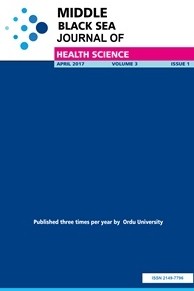Physiotherapy Outcomes in a Male Patient with Post-Traumatic Bilateral Facial Nerve Paralysis: A Case Report
Physiotherapy Outcomes in a Male Patient with Post-Traumatic Bilateral Facial Nerve Paralysis: A Case Report
Bilateral Facial Nerve Paralysis (FNP) due to the temporal bone fracture is rare condition. Management of the bilateral FNP is challenging. There is no study on the results of the physiotherapy in bilateral FNP. This report represented the outcomes of physiotherapy in a twenty-one years old, male patient with bilateral FNP. The functional status of the patient progressed from grade V to grade II in House-Brackmann classification. His facial symmetry also improved. The physiotherapy methods, such as massage, electrical stimulation, exercises, are useful to restore the normal facial function in this case. In conclusion, physiotherapy approaches also are effective in the treatment of bilateral FNP. It can be used as an alternative in the conservative treatment of FNP.
___
- References Bascom, DA, Schaitkin BM, May M, Klein S. Facial nerve repair: a retrospective review. Facial Plast Surg. 2000;16:309 –13.
- Brach JS, VanSwearingen JM. Physical therapy for facial paralysis: a tailored treatment approach. Phys Ther. 1999;79:397-404.
- Cederwall E1, Olsén MF, Hanner P, Fogdestam I. Evaluation of a physiotherapeutic treatment intervention in "Bell's" facial palsy. Physiother Theory Pract. 2006;22:43-52.
- Diels H. New concepts in nonsurgical facial nerve rehabilitation. In: Myers E, Bluestone C, eds. Advances in Otolaryngology-Head and Neck Surgery. Chicago: Mosby-Year Book. 1995; 289-315.
- Foecking EM, Fargo KN, Coughlin LM, Kim JT, Marzo SJ, Jones KJ. Single session of brief electrical stimulation immediately following crush injury enhances functional recovery of rat facial nerve. J Rehabil Res Dev. 2012;49:451-8.
- Friedli WG, Meyer M. Strength-duration curve: a measure for assessing sensory deficit in peripheral neuropathy.J Neurol Neurosurg Psychiatry. 1984;47:184-9.
- Keane JR. Bilateral seventh nerve palsy: analysis of 43 cases and review of the literature. Neurology. 1994;44:1198-202.
- Kiese-Himmel C, Laskawi R, Wrede S. Psychosocial problems and coping with illness by patients with defective healing after facial paralysis. HNO. 1993;41:261–7.
- Li J, Goldberg G, Munin MC, Wagner A, Zafonte R. Posttraumatic bilateral facial palsy: A case report and literature review. Brain Injury. 2004;18:315-20.
- Pereira LM, Obara K, Dias JM, Menacho MO, Lavado EL, Cardoso JR. Facial exercise therapy for facial palsy: systematic review and meta-analysis. Clin Rehabil. 2011 Jul;25(7):649-58.
- Sardaru D,Pendefunda L. Neuro-proprioceptive facilitation in the re-education of functional problems in facial paralysis. A practical approach. Rev Med Chir Soc Med Nat.2013; 117:101-6.
- Şimşek N, Kırdı N, Meriç A, Savcı S, Korkmaz ÇN, Fırat T et al. Elektroterapide Temel Prensipler ve Klinik Uygulamalar. First Edition. Ankara: Pelikan Yayıncılık; 2015.
- Teixeira LJ, Valbuza JS, Prado GF. Physical therapy for Bell’s palsy (idiopathic facial paralysis).Cochrane Database Syst Rev. 2011; Issue 12.
- Tuncay F, Borman P, Taşer B, Ünlü İ, Samim E. Role of electrical stimulation added to conventional therapy in patients with idiopathic facial (Bell) palsy. Am J Phys Med Rehabil. 2015;94:222-8.
- Yayın Aralığı: Yılda 4 Sayı
- Başlangıç: 2015
- Yayıncı: Ordu Üniversitesi
Sayıdaki Diğer Makaleler
Burcu DEMİREL YILMAZ, Hayri GENÇ, Bengi BAYSAL, Banu EREN
Burcu ÇUVALCI, Sevilay HİNTİSTAN
